Alex Salmond: Scotland is 'the winner' after referendum vote
- Published
- comments
Scotland's First Minister Alex Salmond has said "all of Scotland will emerge as the winner" following the vote against independence.
Mr Salmond said the nation was now the most politically engaged in western Europe, as he pledged to work on delivering more powers for Holyrood.
He also called for the voting age to be lowered to 16 in future UK elections.
Opposition politicians said the referendum outcome represented the "settled will of the Scottish people".
The comments came as as the head of the new commission on delivering more powers to Scotland, Lord Smith, warned it would "not be easy" to get agreement from the Scottish parties on the issue.
Democratic world
As the Scottish Parliament met for the first time since last Thursday's referendum, Mr Salmond told MSPs: "Scotland now has the most politically engaged population in western Europe and one of the most engaged in any country, anywhere in the democratic world.
"Across Scotland, people have been energised, enthused by politics in a way which has never happened before - certainly not in my experience and I suspect in the experience of anyone in this chamber.
"Wherever we're travelling together, we're a better nation today than we were at the start of this process. We are more informed, more enabled and more empowered."
Mr Salmond, who stands down as first minister and SNP leader later this year, added: "As a result of that, our great national debate in my estimation will help us make a fairer, more prosperous and more democratic country - and in all of that, all of Scotland will emerge as the winner."
The first minister also said the case for 16 and 17-year-olds being allowed to vote in all UK elections - as they were in the independence referendum - was overwhelming and unanswerable.
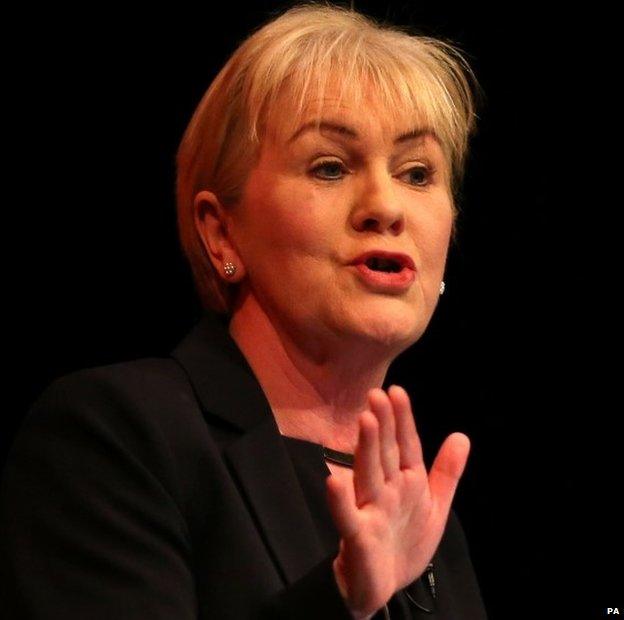
Scottish Labour leader Johann Lamont said people in Scotland had voted to stay in the Union
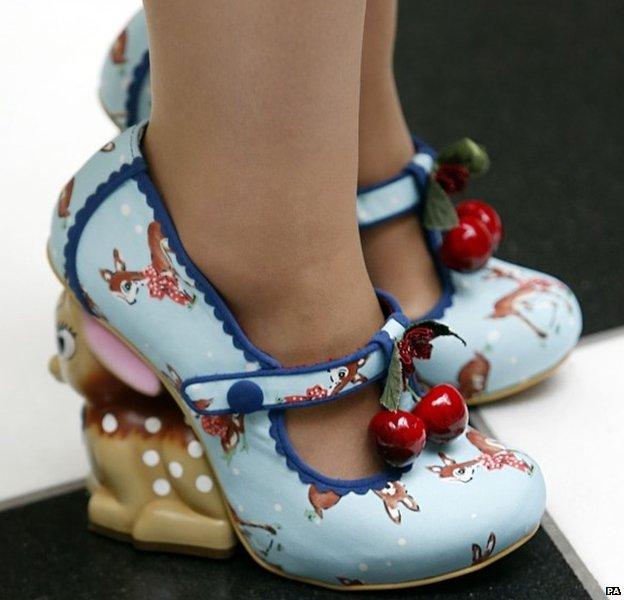
Youth Employment Minister Angela Constance was spotted wearing a fetching pair of shoes to the Holyrood debate
And he again warned Westminster leaders that the people of Scotland would not tolerate any delay in them delivering on their pledge of more powers for Holyrood.
Ms Lamont said the reality was that voters in Scotland had backed the union by 55% to 45%, in the referendum.
She told the chamber: "Much has been made by the 'Yes' side of the 1.6 million Scots who supported their case. It is an amazing achievement to get that many people in a country of this size to vote for any proposition.
"But we should recognise the achievement of the 'No' side, which gained two million votes of support who believed we are stronger as part of the United Kingdom."
She said of Mr Salmond: "While he might not have got he result he was looking for, we can all agree that the United Kingdom is now the settled will of the Scottish people.
"No longer will our United Kingdom see the consequence of a deal struck by the privileged few.
"It is now the choice of the many, expressed in a fair and democratic way in which we can all have confidence."

Analysis: Brian Taylor, political editor, BBC Scotland
The division in the referendum could scarcely have been more fundamental: "Should Scotland be an independent country?"
Answer given, it was incumbent upon our elected politicians to rise to the challenge of seeking a degree of consensus. The alternative, of course, would be political stasis.
In the debate at Holyrood, today, they rose to the challenge, for the most part. Indeed, they rose to the challenge rather well.
They agreed that the turnout had been remarkable, energising.
They agreed that the experiment in enfranchising 16 and 17-year-olds had worked well and should be extended to other ballots.
They agreed that the conduct of the referendum had been, mostly, a credit to the people of Scotland, enhancing our global reputation.
Admittedly, there was some dispute over that.

Scottish Conservative leader Ruth Davidson said she understood people on the "Yes" side of the debate were experiencing grief after the result, but added: "That pain is not healed by people crying foul and that grief is not ministered to by talk of a conspiracy.
"To truly come back together and move on, we need acknowledgement that the process was not flawed."
She added: "Because, since Friday, we've had three senior nationalists, including the first minister himself, saying there are other ways to unilaterally declare independence.
"We need those at the top to respect and accept the result, because without such acceptance, we cannot move on. And move on we must."
Willie Rennie, the Scottish Liberal Democrat Leader, expressed concern about comments from the first minister following the "No" vote, which included claims that voters were "tricked" into voting "No" with a late offer of more devolved powers.

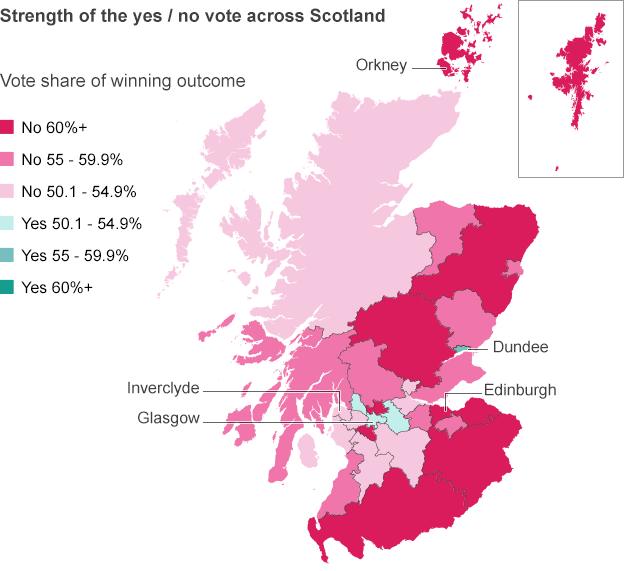

"The first minister is fond of expressing great confidence in the ability of the Scottish people, but to my great disappointment over the weekend, that confidence evaporated," said Mr Rennie."The first minister should not question the judgement of the Scottish people, just because they did not agree with him."
However, Mr Salmond dismissed claims he intended to make a unilateral declaration of Scottish independence.
Meanwhile, Lord Smith is starting talks with the SNP, Scottish Labour, Scottish Conservatives, Scottish Liberal Democrats and Scottish Greens with the aim of reaching an agreement. Legislation on new powers is due to be unveiled by the end of January.
Patrick Harvie of the Scottish Greens, Holyrood's other pro-independence party, expressed concern about which powers might come to Scotland from Westminster.
He said: "My concern is about the idea of a transfer - not of genuine economic power, the ability to run different economic policy for Scotland's different circumstances - but instead the transfer of a responsibility to implement somebody else's economic policy.
"At the moment, that means making Westminster's cuts on their behalf."
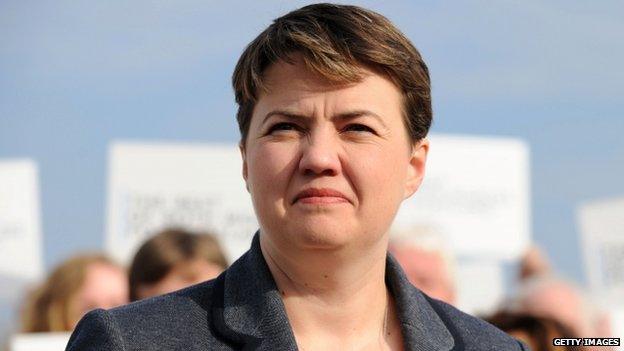
Ruth Davidson: "Respect and accept the result"
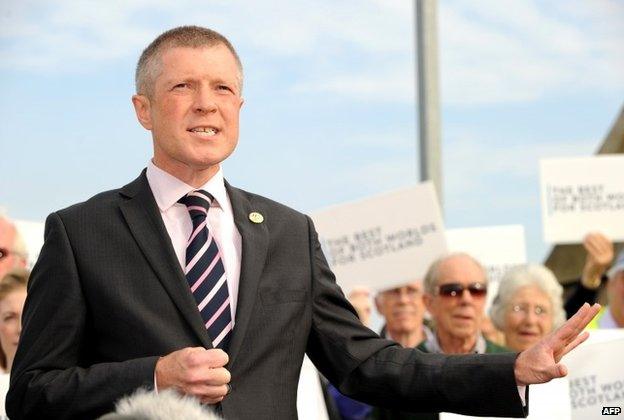
Lib Dem leader Willie Rennie said Scotland must move on after the result
Lord Smith, whose appointment was announced by Prime Minister David Cameron, said the five Holyrood parties required "courage" and "compromise" to agree on the way forward.
Meanwhile, nominations for the post of SNP leader are expected to open on Wednesday, with the party's current deputy leader, Nicola Sturgeon, expected to emerge as the clear frontrunner.
On Monday, Prime Minister David Cameron hosted a summit of senior Conservative MPs at Chequers to discuss plans to limit the Commons voting rights of Scottish MPs.
The prime minister has said a pledge to give Scotland more powers should go hand-in-hand with changing the role of Scottish politicians at Westminster.
But he is under pressure from Conservative backbenchers angry at the way Mr Cameron, Labour leader Ed Miliband and Lib Dem leader Nick Clegg teamed up to offer more powers to Scotland.
Meanwhile, UKIP leader Nigel Farage told an audience in London he has "had enough of the Scottish tail wagging the English dog".
The MEP promised to campaign for a English parliament.